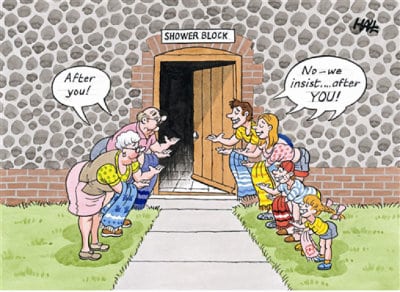If you are new to the caravanning world or want to enhance your good form, here is a guide to caravanning etiquette.
Caravan Park/National Park/Recreation Areas
∆ Follow the park rules.
∆ Say hello to your neighbours and consider others at all times.
∆ Don’t walk through anybody else’s site.
∆ Make sure your pet is under control. Not everyone is an animal lover. Also, ∆ make sure that pets are allowed in the park.
∆ Park your vehicles on your own site or designated parking area.
∆ Toilet waste to be disposed of in designated dump stations or toilets.
∆ Wash down a dump station with the hose provided after emptying your holding tanks.
∆ Use a sullage hose for grey water.
∆ Use the allocated entertainment and activities areas – especially children.
∆ Keep noise levels down – particularly before 8am and after 10pm. This applies to music, generators and loud TV sets.
∆ Light campfires if allowed only in designated area; never leave unattended; extinguish thoroughly.
∆ Remove all rubbish from your site when you leave and ensure the site is as clean as or cleaner than when you arrived.
∆ Care for the environment and protect trees, shrubs and other natural surrounds.
Driving
∆ It is essential that you remain aware at all times of the fact that you are towing or driving a significant weight.
∆ Check rear vision mirrors frequently.
∆ Keep within the legal towing speed limit.
∆ Drive in the left hand lane except when passing and allow extra room when overtaking.
∆ When travelling in convoy, leave enough room for other vehicles to pass one van at a time.
∆ Pull off the road periodically to allow other cars to pass.
∆ On gravel and narrow roads, pull off the road and stop to allow large trucks to pass.
∆ Acknowledge fellow caravanners and RV drivers as you pass them on the road.
Disclaimer
The staff at CCIA & MHIA have used their best endeavours to ensure that all the information provided is correct at the time of release and that the information has been obtained from reliable sources. We are not responsible for any errors or omissions, or any outcomes as a result of a use of this information. The information is provided for general guidance on industry issues only and should not be used as a substitute for legal or other professional advice.




